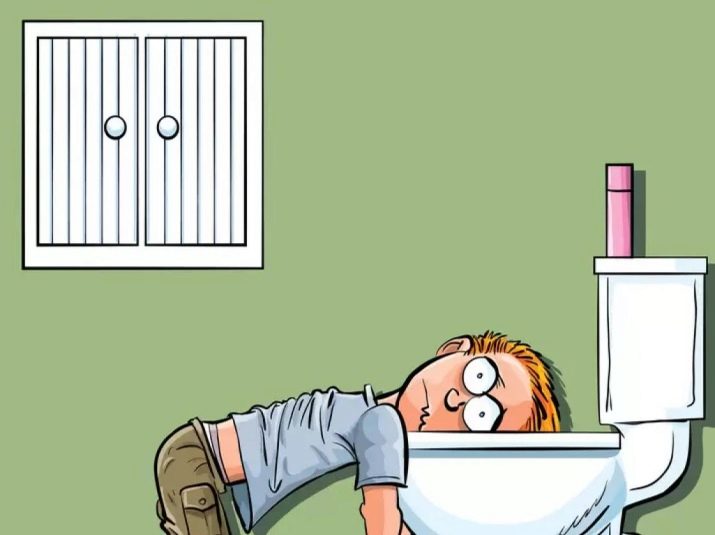To a certain extent, each of us needs recognition and success. And the thoughts about the possible defeat, the unsuccessful outcome of any business cannot be considered as pleasant. But there are people whom fear of failure makes you give up on affairs and undertakings, in general. Such people are called atiphiobs.
What it is?
Atyphobic represents pathological irrational fear of failure. The name of this mental disorder received from the Latin atyches - "unhappy" and Greek φόβος - "fear." This disorder is considered to be one of the most common in the modern world, but despite this, only a small part of atihyfobov comes to psychotherapists and psychiatrists to receive adequate treatment. The rest habitually write off what is happening on their own character.
In all situations where there is even the slightest hint of competition as such, people with antihyphobia see a close connection with danger, they believe that they will fail, and experience their own fiasco.
As a result, in order not to live through it in reality, the atyphifob refuses to participate in this matter, and therefore the attainment of life success for him becomes an unattainable, unrealistic goal.
A person is not confident in his strengths, knowledge, abilities, capabilities, and therefore prone to depression and the emergence of more severe mental pathologies. Atiphiphobia is considered a destructive phobic disorder. It can not only destroy the life of a person in various aspects, but also cause irreparable harm to his health. Against the background of the constant expectation of failure, many begin to use alcohol, drugs, in order to at least temporarily relax, stop thinking about the prospects for their own defeats and mourn the missed opportunities that a person did not dare to use while there was a chance.
This phobia by specialists belongs to the category of social. In childhood, we all expect praise from parents for a beautiful drawing, successfully made crafts, estimates at school. When we grow up, the need for praise does not diminish, and at some points in our life, it can escalate.
If, from childhood, it was difficult for a person to achieve praise (he was often criticized), then with a high degree of probability he will have a rather pronounced underestimated self-esteem as an adult.
It is she who underlies his fear of not becoming the best, of failing. A healthy person differs from atyphifob in the ability to philosophically treat defeat. People with such a mental disorder cannot judge the situation sensibly, painfully experiencing even their minor mistakes. Just the thought that failure can happen again causes panic horror, a terrible excitement, to atihihipa, it is difficult for him to cope with these emotions.
Excitement before its possible (still not happening) failure forces a person to carefully avoid any situations related to competition. - admission to the university, interviews for a job, participation in creative contests and sports competitions, and even from the prospect of creating a close relationship with your beloved person, atihyfob will immediately refuse if a rival appears on the horizon.
Varieties
Of all the types of phobic mental disorders, athyphobia has the greatest number of forms in which it can be observed, this is why true atiphi-fi is so difficult to recognize.
- Self-clearance and self-isolation - in this form, atiphifob refuses to participate in any events that imply competition (does not go for an interview, refuses to participate in various events and projects, any, even minimal possible obstacles to achieving the goal become insurmountable).
- Self sabotage - fear of failure has the form of persistent conviction, confidence that everything will end badly. The patient does not refuse to participate in the events, but tries to do everything on a subconscious level so as not to achieve a positive result. Then he says that he “knew that.” The orders that such atihifobs receive are usually carried out for a very long time, they are diligently delayed, the person reaches the point of absurdity and begins to show signs of incompetence.
- Immobilization - in this form, antihyphobia is taken by the patient as a character trait. He does not fight, does not seek to overcome his insecurity, he stays idle and answers all the questions from the side: “Yes, I am so.” These patients tend to withdraw into themselves, they do not develop, do not grow in professional and personal terms.
They say to themselves that they do not have the ability, and were the last in the line when God distributed talents, and they did not have enough.
- Perfectionism - the person really wants to be the best, but is afraid to fail, and therefore has to take a lot of effort to prevent even theoretically no erroneous or rash actions. The desire to be the best becomes an obsession. Any work for which such an athyphobe is taken turns into stress for him, since he throws all his energy into doing everything “to the point”. True, with this form of phobic disorder, the patient never takes up the business from a sphere that is unfamiliar to him, confining himself to a single, basic field of activity.
For example, a successful programmer with perfectionism takes on the most difficult professional tasks, but cannot bring himself to overcome fear and take part in the “Merry Starts” at school with his own child. Or, for a woman - a teacher of literature, the idea of going on a trip with the students on weekends seems to be completely unacceptable, since she is simply afraid of being ridiculed.
All types of antihyphobia are peculiar low self-esteem and high self-criticism.
Causes
Psychology and psychiatry attach particular importance to the study of the causes of the development of fear of defeat. Considering how widespread this phobia is, it is necessary to develop the most effective methods of assistance. Experts tend to believe that Various reasons can cause atiphi-phobia, among which the leading place in personal negative experience.
The experience of experienced failures can be especially painful and traumatic for a person, if he has a tendency to generalize. In this case, for some single story or situation, a person begins to judge a phenomenon or event as a whole. So, having made a mistake once, having failed, a person concludes that he, in general, cannot do anything worthwhile, that his abilities are not great enough, that he lacks knowledge and skills and, in general, he is a loser. This belief starts a series of negative reactions, the desire to do something or achieve something almost at the root is blocked.
Most often, according to the observations of specialists, atyphiophobia develops against the background of self-doubt, which is formed in many more in childhood or adolescence.
First of all, parents can influence their low self-esteem, more precisely, their attitude to misses and failures of the child. If it is customary in the family to demand that the child be the best in school, sport, music school and drawing studio, while the child has the best grades in the class, the child is in constant stress - it's difficult to keep up everywhere.
If in the family, even success is perceived as something taken for granted, which is why there is no encouragement, the child forms a distorted view of his own achievements. For failures, perfectionist parents can severely scold and even punish, and this immediately affects the perception of themselves as incapable of achieving success.
There are a lot of antihyphobic people over whom peers in the team laughed.
Moreover, it is not at all necessary that actions and actions were a motive for ridicule, sometimes they make fun of personal qualities, character traits. This often happens in kindergarten teams, in schools, sections and even in the first years of higher education. At any time, against the background of a strong dissatisfaction with the victim, ridicule may develop a fear of failure.
More subject to fear impressionable people, suspicious, prone to anxiety.
Symptoms
Atychifoba just find out among other people. He is always anxious, very worried about important events. If you have to do something, agree on something, perform some responsible work, besides anxiety, atihyfob experiences a whole range of vegetative symptoms. His heartbeat quickens, an unpleasant feeling appears in the stomach, the skin becomes paler, sweating may increase.
In a state of fear, athyphi-bobs often shake hands, the pupils dilate, the pulse becomes frequent, and breathing becomes shallow. Many say that there are pressing pains in the heart area. Some become sharply nervous, fussy, irritable, while others, on the contrary, fall into a state of stupor.
When fear of failure is a fairly common symptom is diarrhea, nausea, insomnia.
For example, before an important exam or a patient interview can lose sleep, he cannot get rid of obsessive thoughts, scrolling in his head possible scenarios for the upcoming case in a negative light, diarrhea and nausea develop. From the usual excitement before an important event, which is characteristic of all people, the attack of atiphiobia differs primarily in the fact that all manifestations are on the verge of a panic attack, and panic attacks themselves are possible.
At the same time, the person understands that there is no reason to worry yet, after all, nothing terrible has happened, perhaps everything will be fine, but it cannot cope with horror, manifestations of atiphiobia are not amenable to volitional influence and control.
How to get rid of phobias?
With this phobia, it is very important to consult a doctor, since it is almost impossible to overcome this form of social pathological fear on your own. Asking for help is already a big step towards overcoming fear. Psychotherapist or psychiatrist begins treatment with the establishment of "children's history" - interview the patient about his childhood, parenting, about what and in what situations he was punished, how the person’s relations with classmates, classmates, people of the opposite sex were built. It helps to find the root causes of low self-esteem.
The doctor will determine how his patient himself relates to his failures and failures, how things stand with the presence of motivation to achieve success.
This will help special tests, as well as hypnotherapy, if a person can not remember the events from childhood, which may have led to the development of phobic disorders.
Among the methods of psychotherapeutic treatment of particular effectiveness has method of modeling situations. The doctor creates a description of situations that have ended for the patient a complete failure. The task of the patient is to describe in as much detail as possible all the nuances of the sensations and feelings that he experienced during the defeat process and after it. The treatment is based on sincerity - if it is not there, then it will be very difficult to overcome the phobia, to remove its manifestations.
Group classes are useful, since communication with people who are afraid to fail - helps a person in a relaxed atmosphere to look at their own problem from the side.
In the group, he feels support from other participants in the class, and this is very important for him.
There is no medicine to fight antihyphobia. But the doctor may, at his own discretion, recommend antidepressants if you notice that the patient has depressive moods, hypnotics in case of sleep disorders.
During the course of therapy to the patient It is recommended to avoid stress, alcohol, drugs. They are invited to learn more about the biographies of successful people. Usually their victories were the results of many failures, which became the basis of such a valuable and important victory experience.
How to overcome the fear of failure, see below.


























